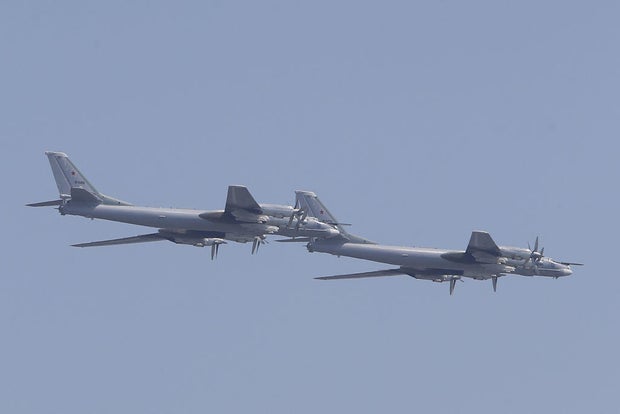By Faris Tanyos, Steve Smith
/ CBS News
7/24: The Daily Report with John Dickerson
The U.S. military intercepted several Russian and Chinese bombers in international airspace near the coast of Alaska Wednesday.
Two Russian Tu-95s and two Chinese H-6s entered what is known as the Alaska Air Defense Identification Zone, North American Aerospace Defense Command said in a statement Wednesday night.
The aircraft were “detected, tracked and intercepted,” NORAD said. They remained in the Alaska ADIZ and did not enter U.S. airspace.
The bombers were intercepted by U.S. F-16 and F-35 fighter jets, along with Canadian CF-18s and other support aircraft, a U.S. defense official confirmed to CBS News.
The official said that this marks the first time ever that Russian and Chinese aircraft have jointly entered the Alaska ADIZ, and the first time Chinese H-6s have encroached off Alaska.
While the Alaska ADIZ is considered part of international airspace, it is defined as an area where sovereign U.S. airspace ends but “that requires the ready identification of all aircraft in the interest of national security,” according to NORAD.
The activity from the Russian and Chinese bombers was “not seen as a threat,” NORAD noted.

In February, the U.S. detected four Russian warplanes flying in the Alaska ADIZ, as was another Russian military aircraft in May 2023.
And in February 2023, Russian warplanes were intercepted there twice in one week. And that same month, a Chinese spy balloon was detected near Alaska before eventually making its way across the continental U.S. and being shot down off the coast of South Carolina.
Military activity by the U.S., Canada, Russia and China has also ramped up in the Arctic. Just days ago, Moscow said it scrambled fighter jets to intercept two U.S. military long-range bomber aircraft that approached the Russian border over the Barents Sea in the Arctic.
Russia has ramped up military operations in the Arctic Circle, including tests of advanced hypersonic missiles. Earlier this month, Canada’s defense ministry said it plans to acquire 12 new submarines capable of traveling under sea ice to bolster the defense of the country’s vast Arctic coastal region.
China has expanded its own underwater fleet, and Russian submarines continue to collect intelligence in Arctic waters, the Canadian defense ministry said.
— Eleanor Watson contributed to this report.
Faris Tanyos is a news editor for CBSNews.com, where he writes and edits stories and tracks breaking news. He previously worked as a digital news producer at several local news stations up and down the West Coast.


